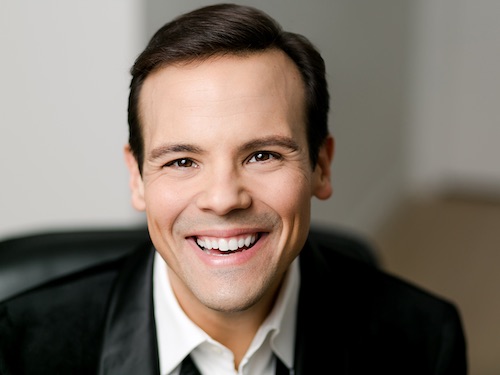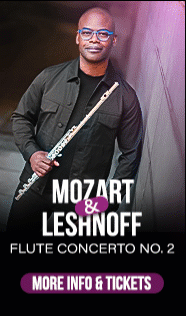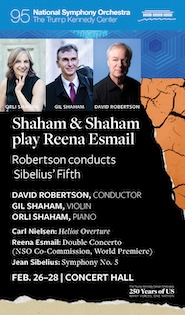Portillo’s pleasing recital marks Vocal Arts’ live return to the Kennedy Center

Vocal Arts DC presented tenor David Portillo in a recital Sunday at the Kennedy Center.
Classical music presenters are canceling live events again in the face of the spreading of the Omicron variant.
One organization holding the line is Vocal Arts DC, which presented its first live recital in 23 months Sunday afternoon. Tenor David Portillo and pianist Craig Terry took the stage of the Kennedy Center Terrace Theater, the first in-person event for this esteemed lieder series since mezzo-soprano Sasha Cooke’s recital in February 2020.
The sparseness of the audience allowed for plenty of social distancing. Portillo has appeared regularly in the area since his days as a young artist with Wolf Trap Opera Company, most recently as a sterling Tamino in Washington National Opera’s 2019 Magic Flute. His intriguing program focused on two sides of the singer’s identity, featuring gay composers on the first half, followed by Hispanic composers on the second.
Religious sentiment pervaded the opening set of three songs, beginning with Aaron Copland’s ebullient setting of “Zion’s Walls,” from Old American Songs. This joyous paean of welcome set up the more reflective “Simple Song,” excerpted from Leonard Bernstein’s Mass. At the keyboard, Terry caressed the accompaniment, providing a soft veil of sound for Portillo’s sweet, crooning high range.
Benjamin Britten’s “Canticle 1: My beloved is mine, and I am his” provided a weightier counterpart. The poem, “A Divine Rapture” by Francis Quarles, paraphrases the Song of Songs to describe the poet’s relationship to God, but Britten heard it also as a more earthly love song. Portillo’s solid intonation made tuning the dissonant clashes with the piano quite clean, opening up into broader volume in the faster middle section.
The rest of the first half delved into even more eclectic territory. Roger Quilter’s “Fair House of Joy,” from Seven Elizabethan Lyrics, tested the bolder, more forthright side of Portillo’s voice, which remained secure and pleasing into higher territory. In “Susie Asado,” both musicians gave earnest sincerity to the surreal words of Gertrude Stein, set ingeniously by Virgil Thomson with musical nonsequiturs that matched the inscrutable literary style.
Without a pause, Portillo dove into the much darker world of Samuel Barber’s “I hear an army,” an agitated expression of wartime anxiety, on a poem by James Joyce. Terry summoned up a maelstrom of sound at the keyboard, driving Portillo into howls of anguish at the stark conclusion of the piece (“My love, why have you left me alone?”).
Lee Hoiby’s light-hearted “Where the Music Comes From” countered these menacing clouds. Terry spun a charming lilt from the sing-songy piano part, its rolling rhythms a backdrop for Portillo’s whimsical head voice on the composer’s sentimental poem, skirting the boundaries of doggerel.
Much more solemn was the world premiere of “Fruit of the Flower,” a song by Matt Boehler on a poem by Countee Cullen. The text, broadly about a son not being accepted by religious parents, elicited tense music, with an ostinato figure in the piano that ran through most of the work to create a mood of single-minded obsession.
Marc Blitzstein’s “The New Suit” (“Zipperfly”) dispelled any lingering tension, as Portillo applied his immaculate English diction to the child-like good luck incantations (“Racky moochy wichy wacky”) that permeate Blitzstein’s own poem. In this absurd cabaret satire, laced with jazzy riffs from Terry at the piano, Portillo wished with all the fervor a child could muster for a new suit, all his own, with a zipper fly.
After this quirky first half, an olio of disparate flavors and styles, the second half devoted to Spanish-language songs felt somewhat like an overdose of sugary desserts. One could have used more variety like Alberto Ginastera’s austere song “Triste,” for example, amid the more tonal and sentimental selections by Carlos Guastavino, Manuel de Falla, and Joaquín Turina, all sung with tender reserve and clear Spanish diction.
If anything, the schmaltz level rose toward the end of the program, in songs of a more popular turn, like the tender “Del cabello más sutil” by Fernando Obradors and the broad “Aleluya” of Manuel Ponce, the latter crowned by some impressive, ringing high notes. Dance rhythms enlivened “El dia que me quieras,” by Carlos Gardel, with Terry providing an emotional musical backdrop as Portillo read one of the verses in a melodramatic tone.
More crowd-pleasing high notes gleamed over pulsating dance rhythms in closing songs by Maria Grever and Miguel Sandoval. The final selection, Agustin Lara’s “Granada,” felt like the first encore, a big-boned reading from the singer matched by dramatic escapades for the accompanist. The actual encore, a stately and jazz-tinged arrangement of the Shaker song “Simple Gifts,” brought the recital back to the Bernstein item at its start.
Vocal Arts DC presents a recital by baritone Will Liverman and pianist Myra Huang 7:30 p.m. February 1 in the Kennedy Center Terrace Theater. vocalartsdc.org; 202-669-1463




